Auditing is a complex field with several functions, including risk assessment, regulatory compliance and fraud detection. Each of these processes can be stressful and time-consuming.
Automating these workflows with artificial intelligence (AI) can save time, increase efficiency, improve accuracy, and allow you to focus on more strategic activities.
What is AI in Auditing?
AI auditing refers to the use of artificial intelligence technologies, such as natural language processing (NLP), machine learning, and data analytics, to streamline audit processes. AI-powered tools can analyze large datasets, detect fraud, assess risks, and improve compliance, making auditing more efficient and accurate.
By automating repetitive tasks, artificial intelligence allows auditors to dedicate their time and resources to other higher-value activities.
Key Areas Where AI is Transforming Auditing
Data Analysis
AI algorithms can analyze and process large financial data faster and more accurately than auditors. It can also identify patterns, anomalies, and trends you might overlook. This capability leads to improved insights and more timely reporting.
Automate Auditing Workflows
AI technology can streamline audit workflows, such as data entry, planning and risk assessment. Automating this process reduces the time spent on manual tasks, allowing you to focus on higher-level analysis and strategic decision-making.
Compliance and Regulatory Checks
It is challenging to keep up with constantly changing regulations. AI can help automate compliance checks, ensuring your financial audit checklist adheres to the latest standards. By maintaining compliance, your firm can avoid costly penalties and strengthen client relationships.
Fraud Detection Mechanisms
Fraud detection is a critical aspect of auditing, and AI significantly enhances this process. AI technologies can analyze large datasets in real time to identify suspicious fraudulent transactions. Also, machine learning models can learn from historical fraud cases, improving their ability to detect unusual financial patterns.
Predictive Analytics for Enhanced Risk Management
AI-powered predictive analytics tools can forecast future trends based on historical data, allowing you to advise your clients proactively.
For example, if the analytics suggest an impending downturn in a client’s industry, your firm can recommend adjustments to avoid potential risks. Incorporating predictive analytics into your services positions you as a trusted advisor to your clients.
Audit Reporting and Financial Insights
AI-powered tools simplify reporting by generating audit summaries and highlighting crucial insights. They can also help auditors interpret complex financial data faster and more effectively.
Why Artificial Intelligence in Auditing is Essential
Enhanced Data Processing and Analysis
Manually analyzing a vast set of data can be time-consuming and prone to human error. AI excels at processing large datasets quickly and accurately. Its algorithms can sift through thousands of records in seconds, detecting anomalies and uncovering insights that might go unnoticed. This process allows you to provide more timely and accurate client reports.
Increased Efficiency & Speed
Artificial intelligence automates routine tasks such as data collection, report generation and account reconciliation. It reduces the time spent on these time-consuming manual functions and allows you to focus more on reviewing and interpreting audit data.
Improved Audit Accuracy and Reliability
The manual audit workflow is prone to human errors. AI minimizes these errors by accurately processing large volumes of data, ensuring your audit is reliable and consistent. By improving the quality of audits, you can build greater trust with your clients and strengthen your firm’s reputation.
Real-time Monitoring and Risk Assessment
AI tools can continuously monitor financial transactions and flag discrepancies as they occur. This proactive approach lets you identify risks earlier, enabling timely interventions and enhancing overall audit quality.
Greater Compliance with Regulatory Standards
AI cross-checks financial records to ensure compliance with auditing standards and regulatory requirements. This reduces compliance risks and ensures your clients meet legal requirements.
Cost Savings for Firms
AI-driven audits require fewer manual hours, reducing overall costs. As such, you can provide high-value services at a competitive price, which makes your firm more attractive to clients.
Addressing Challenges With Using Artificial Intelligence in Audits
1. Lack of Transparency & Explainability
AI models, especially deep learning algorithms, often operate as “black boxes,” meaning their decision-making process is not always transparent. Auditors need clear explanations for AI-generated insights for accountability and regulatory compliance.
2. Data Quality Issues
AI relies on accurate, high-quality data to deliver reliable insights, detect anomalies, and ensure compliance. Incomplete, inconsistent, or biased data can lead to incorrect audit findings and misinterpretations.
3. Regulatory & Compliance Uncertainty
AI-driven audits must comply with legal and regulatory frameworks, but existing regulations do not always account for AI’s role in auditing. Auditors must navigate evolving compliance standards and ensure artificial intelligence does not introduce new risks.
4. Ethical Concerns & Bias in AI Models
AI systems can inherit biases from the data they are trained on, leading to unfair or inaccurate risk assessments. Ensuring fairness and ethical AI usage in audits requires careful model training, validation, and oversight.
5. High Implementation Costs
Many auditing firms, particularly smaller ones, may have limited budgets and cannot afford the high upfront costs of AI implementation. According to a recent KPMG survey, 49% of companies cite inadequate funding and investment as the top barriers to using AI. As such, they may hesitate to invest heavily in AI if they are uncertain about the return on investment.

6. Skill Gaps
Employees may resist AI adoption due to a lack of technical expertise. 23% of top firms cited a lack of training and infrastructure for incorporating AI technology into their audits.
This skills gap can slow down AI implementation and limit its potential benefits. Without proper training, your team may struggle to use AI tools effectively, leading to inefficiencies and errors. As such, invest in ongoing training to equip them with the technical skills needed to work alongside AI.
7. Data Privacy & Security Risks
AI systems process large volumes of sensitive financial data, making them potential cyberattack targets. Therefore, when using Auditing AI, it is crucial to ensure robust data security, encryption, and compliance with privacy regulations (e.g., GDPR and CCPA).
How to Integrate AI in Your Auditing Firm
To successfully integrate AI into your firm, follow these best practices:
1. Identify Key Audit Areas
Begin by pinpointing specific audit processes where AI can add the most value. Common areas include:
- Anomaly detection in large datasets
- Risk assessment and fraud detection
- Document review and analysis
- Predictive analytics for financial forecasting
Analyze your firm’s current audit workflows to identify bottlenecks and inefficiencies.
2. Develop a Comprehensive AI Strategy
Create a clear plan outlining your firm’s AI goals, timelines, and resource allocation. Ensure your strategy aligns with your overall business objectives.
3. Research and Choose the Right AI Tools
Research and evaluate AI audit tools that align with your firm’s needs. Consider factors such as:
- Functionality and capabilities.
- Ease of integration with existing systems.
- Scalability and performance.
- Vendor reputation and support.
- Cost-effectiveness.
4. Pilot and Test AI Applications
Start with small-scale pilot projects to test the effectiveness of ai tools in real-world audit scenarios. Then, gather feedback from your team and refine it accordingly.
5. Train Your Team
Train your employees on the practical applications of AI in auditing. Encourage them to explore and experiment with AI tools and create a collaborative environment where they can share their experiences and insights.
6. Monitoring and Continuous Improvement
Track metrics, such as audit efficiency, accuracy, and cost savings, and define key performance indicators (KPIs) to measure the effectiveness of your software.
The Future of AI Auditing : What to Expect
1. Integration of Advanced Technologies
The auditing industry will witness the seamless integration of AI with other emerging technologies, such as blockchain, robotic process automation (RPA), and machine learning. For instance, accounting Blockchain can enhance transaction transparency and security, while machine learning algorithms can further refine data analysis capabilities.
Understanding how these technologies complement each other and how you can leverage them will be essential for firms looking to innovate and improve their auditing processes.
2. Regulatory Changes
As AI technology evolves, regulatory environments will also adapt. Regulators will establish new standards and guidelines to address AI’s unique challenges. Be proactive about potential changes and how they may affect your firm and clients to maintain integrity and audit quality.
3. Enhanced Predictive Analytics
According to the aforementioned KPMG survey, over half of companies want their auditors to prioritize predictive analysis.
This means more auditors will increasingly use AI’s predictive analytics to forecast future trends and assess risks based on historical data.
This capability will empower auditors to provide strategic insights and tailored recommendations to clients, helping them overcome potential challenges before they arise. Your firm’s ability to anticipate market shifts will make it invaluable.
Final Thoughts
AI is transforming the auditing industry by increasing speed, efficiency, and accuracy. As a firm owner, embracing AI-driven audit solutions will help you stay competitive, improve efficiency, and provide better client services.
While AI will not replace human auditors, it will augment your capabilities, allowing you to focus on strategic decision-making and complex financial analysis.
Are you ready to take the next step toward AI-powered auditing?
Use Financial Cents to manage your audit engagements.

